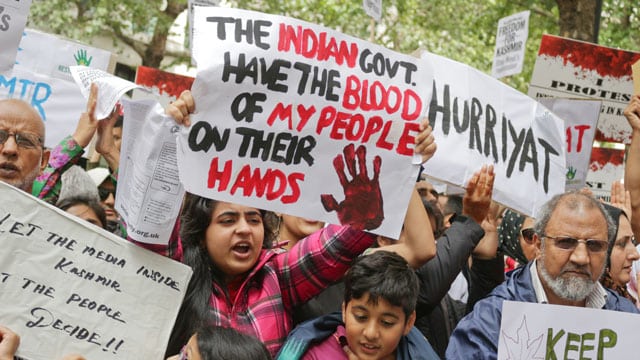

Statement by the Revolutionary Socialist Movement, Pakistan section of the League for the Fifth International
The killing of 25 tourists and a guide in Pahalgam, Kashmir, was not an isolated act of ‘terrorism’, but the inevitable consequence of India’s brutal military rule, its systematic dismantling of Kashmiri rights and the deliberate stoking of Hindu majoritarianism under Modi’s authoritarian regime.
Occupation and annexation
Since the illegal revocation of Article 370 in 2019, Kashmir has been under military occupation. India not only stripped Kashmiris of their autonomy but dismantled all democratic rights.
Over 85,000 domicile certificates have been issued to non-Kashmiris—an attempt to alter the region’s demography, mirroring Israel’s playbook on the West Bank in Palestine.
The current crackdown represents an escalation of this colonial project. Indian media report that security forces have conducted night raids, arresting hundreds under laws that permit indefinite detention without trial. Entire neighbourhoods have been razed.
Thousands have disappeared into torture chambers and extrajudicial killings are falsely labelled ‘encounter deaths’. Such brutal repression has deepened Kashmiri resistance. The Indian state treats Kashmir as a hostile territory that needs to be militarily pacified.
Narendra Modi also threatens to suspend the Indus Water Treaty, weaponising water access against Pakistan. Increased ceasefire violations along the Line of Control bordering Pakistani Kashmir risk a broader war. Echoing Donald Trump’s threats and Vladimir Putin’s invasion of Ukraine, Modi is whipping up nationalism to build up India as a regional power.
In response, Pakistan has announced a halt to trade with India and threatened to expel its citizens. Indian and Pakistani armed forces are already engaged in combat, even if ‘only’ skirmishes. While both want to contain the conflict, they are playing with fire, raising chauvinist sentiments in both countries.
Media frenzy
Indian media have sunk to new depths, some openly demanding the razing of Kashmir ‘like Gaza’. Such calls nurture fascist tendencies amongst the Indian ruling class and petty bourgeoisie.
India’s entire political class is complicit in Kashmir’s occupation. The Congress Party, while ‘critical’, accepts the occupation as a fait accompli. The Communist parties (CPI and CPI-M) formally opposed the revocation of Article 370, which ended Kashmir’s autonomy, but they have failed to resist the occupation.
Regional outfits like AAP, BSP, and TMC have either cheered the annexation or acquiesced with mealy-mouthed protests. Even parties posing as defenders of minorities—the DMK, NCP and others—have tacitly endorsed the crackdown.
This cross-party consensus shows that Kashmir’s oppression is not merely the BJP’s project but was a crime the Indian state committed at its foundation. Revolutionary socialists must call for an independent workers’ movement that answers to no Delhi establishment—whether saffron or ‘secular’.
The left’s failure is most damning. Despite their criticisms of constitutional changes, they have never supported the right of Kashmir to self-determination, nor mobilised solidarity action.
No justice, no peace
Oppressed peoples often have to resort to asymmetric struggle. India has 900,000 troops stationed in Kashmir against a population of 12.5 million; it bears full responsibility for the violence. The Pahalgam attack was the consequence, not the cause.
The response by mainstream left organisations, like Pakistan’s Haqooq-e-Khalq Movement (HKM) led by Farooq Tariq, exposes the limitations of liberal ‘anti-terrorism’. By beginning with condemnation of the attack, rather than the occupation, they treat India’s violence as a legitimate ‘security’ action, while resistance is criminalised.
While unambiguously opposing attacks on civilians, revolutionary Marxists understand that simply condemning violence, without first opposing its root cause, makes one complicit in the repression. Under Indian sovereignty, calls for ‘peace’ and ‘dialogue’ reward the aggressors who demand Kashmiris surrender their right to resist before negotiations even begin.
Against this liberal capitulation, we unconditionally oppose India’s occupation. We call for solidarity with Kashmiri resistance, while arguing for working class methods of political struggle: building bridges between Kashmiri resistance fighters, other oppressed nations in South Asia, and the Indian and Pakistani workers who have no stake in their rulers’ wars.
The way forward
The ruling classes of India and Pakistan exploit nationalism to divide workers and peasants. While Delhi occupies Kashmir, Islamabad’s military establishment oppresses Balochistan. Neither offers liberation; both serve their own interests.
The solution lies in revolutionary internationalism. The working classes of the whole region share no stake in these conflicts—their enemies are Modi’s Hindutva chauvinism, the Pakistani military’s authoritarian rule, and the capitalist system that profits from their division. United struggle can break the chains of occupation, caste, and exploitation.
However, appeals to the existing states for peace are not enough. We need a transitional struggle to expose the limits of bourgeois rule, while pointing towards socialist revolution.
To coordinate this and give it revolutionary direction, we must build a revolutionary workers’ party with a programme of internationalist revolution. Only such a party can link all struggles, provide strategic leadership, and prepare to replace capitalist states with workers’ states, based on workers’ councils and militia.
We demand: